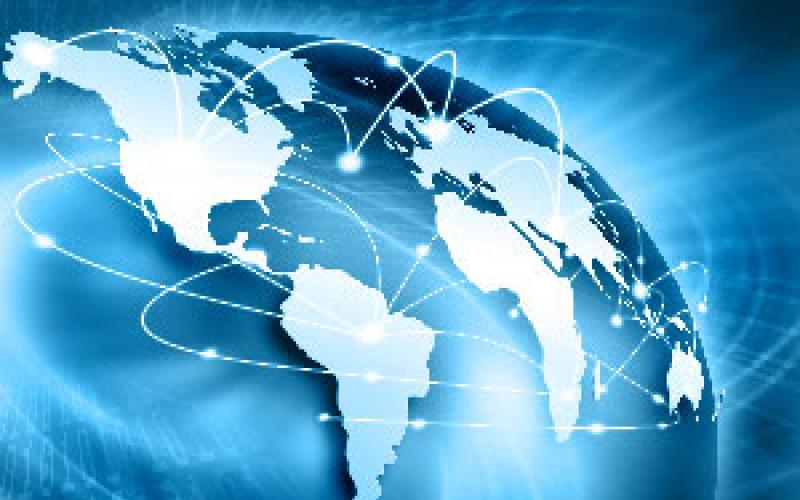For a long time there has been a heated discussion on such questions: how is the Internet useful for a person? Is it harmful to our health?
Today, no one can imagine their existence without the Internet. He entered our lives too quickly and sat down too firmly there. The Internet for people is already a necessity that is needed like air.
Let's give you some statistics:
95% of teenagers use Internet;
85% of adults use the Internet;
Every seventh person is registered in facebook;
By 2016 nearly 3 billion of people use the Internet;
If for a moment imagine the Internet as a separate country, then it would occupy the 5th place in terms of economic level, thereby ahead of Germany.
How useful is the Internet for a person?
Undoubtedly Internet- a huge achievement of mankind. With its help, we can watch movies, find new friends, communicate with relatives and friends who live far away, look for answers to our questions, solve complex and incomprehensible tasks for us, find useful and interesting information, learn various events and news. The Internet helps us to become developed and erudite people.
One of the main advantages of the Internet is considered to be "blurring". We can communicate with people who live on other continents and in other countries, while finding new friends, and possibly love.
Some people, in order to become more educated, study foreign languages on their own, watch various trainings, online courses, etc. Many even manage to get through Internet for a good job with a decent salary, and this is not the limit. The Internet itself is already considered a good source of income. Today, there are many professions associated with it.
How does the Internet harm a person?
 “With the naked eye” it is clear that the Internet can bring a lot of good and useful things to a person. But, unfortunately, it brings no less harm. First of all, the main problem is Internet addiction. It has already been proven that 10% of people are dependent on Internet. They consider it as important and necessary as family, home, water and food. In some countries, Internet addiction is already regarded as a national problem.
“With the naked eye” it is clear that the Internet can bring a lot of good and useful things to a person. But, unfortunately, it brings no less harm. First of all, the main problem is Internet addiction. It has already been proven that 10% of people are dependent on Internet. They consider it as important and necessary as family, home, water and food. In some countries, Internet addiction is already regarded as a national problem.
Also, one of the most common problems was poor eyesight and deterioration of the musculoskeletal system in people due to a long stay at the computer.
The disadvantages of the Internet include the fact that there are many scammers. They, in turn, can take your personal information and use it for their own purposes.
If we compare the benefits and harms of the Internet, then the benefits, of course, "outweigh" the harms, but this is only if you use Internet wisely.
Internet and children.
Today, children use the Internet much more often than adults. Of course, it also brings a lot of useful things for them: new friends, communication, reading books, watching historical and documentary films, and much more.
Everyone knows that the younger generation is increasingly doing their homework using the Internet. Why do you need to "puzzle" over a complex problem, if you can just "get into the Internet" and find the right solution with the answer?
But the main problem is not this. Internet it is simply teeming with such information that can simply harm the healthy psyche of a small child - this is pornography, violence, blood, murder, etc. In addition, children are completely immersed in the virtual world, forgetting about their "live" and "real" friends.
In addition to this, children are more vulnerable than adults. It is much easier for them to “sick” with Internet addiction. Due to the long stay at the computer, children are prone to obesity, insomnia, and poor eyesight.
In order for you to be able to avoid all this problems, negotiate with your child a specific time spent at the computer, and also carefully monitor what he is browsing on the World Wide Web.
You can't forget about yourself either. You should also control your time at the computer, give your eyes a rest, get up more often and walk "back and forth."
Take care of your health, walk on the street more often, communicating with “real” people!
Hurricane Javier, which covered Minsk on the eve of the weekend, paralyzed the city. Using the Internet, volunteers and drivers organized help for those who cannot get out of the city. How the Internet is used to organize help - in our article.

Natural disasters in the modern world are easier to experience thanks to the Internet and specially created sites help the victims and organize volunteers. How exactly the Internet is used to organize mutual assistance - in our article.
Hurricane Javier, which covered Minsk on the eve of the weekend, paralyzed the city. Using the Internet, volunteers and drivers organized help for those who cannot get out of the city. To begin with, those who need help were noted in the comments to the news on the Tut.by website.
In addition, volunteers created two websites - one with a form to help those affected by the hurricane, and the other with a table in which volunteers entered information about how they can help.
The history of Minsk online help is just one example of how the Internet helps the victims.
By the summer of 2012, when the emergency occurred in Krymsk, Runet had already learned to consolidate in difficult situations and help the victims.
After the flood, a website was created, which contained up-to-date information about assistance to the victims, news, data about volunteers. This project existed alongside the official resource.
Internet users from the United States and Western European countries use not only special websites for mutual assistance and coordination of volunteers' actions, but also social media, in particular, social networks Twitter, Facebook and others. After the Icelandic volcano erupted, airport passengers who could not get home could request and receive help from volunteers using the hashtag #getmehome.
At the same time, it was possible to search on special websites roadsharing.com and VolcanoHelp.eu for fellow travelers who would take the victims home in cars or, at least, take them out of cities with blocked airports.
The aftermath of Hurricane Sandy was also accompanied by the active work of volunteers, whose efforts were coordinated via the Internet. For example, the websites of public organizations posted requirements for volunteers and information about what kind of help people need in different areas of New York.
The corresponding pages on their websites were created by the American Red Cross, Catholic institutions, and local communities. In addition, special sites have appeared for mobilizing volunteers.
The authorities of some countries are planning to introduce systems for alerting their citizens about emergencies through social media. In particular, the Japan Security Council is preparing to launch a system based on Twitter - this system will work from the summer of 2013.
Back in 2009, the Australian authorities announced the creation of a similar system based on Facebook and Twitter, this system will be designed to notify about fires and other natural disasters.
Many such examples could be cited. New challenges associated with natural and man-made disasters have shown that the modern Internet, social networks, Twitter and Facebook can successfully cope with the tasks of organizing assistance to victims, alerting the population about threats, and sometimes providing people with vital information.
Volunteers in Russia, the United States, and other countries around the world who want to help those in need can easily find a scope for their efforts. It was worth inventing the Internet, Web 2.0 and social media for this alone.
The Internet came into people's lives not so long ago, but it had a significant impact on them. Firstly, the Internet has connected people around the world with an invisible web, and now it is not difficult to communicate with the person who is on another continent. There was even such a thing as network etiquette, which included the rules of communication on the Web.
Personal relationships have undergone significant changes with the advent of the Internet. Now every day in the virtual world you can make new acquaintances and friends. However, thanks to this lightness and simplicity, friendships have lost their depth and seriousness. Sometimes virtual friends do not even think about personal meetings. They have enough easy and easy correspondence on general topics. Moreover, people are considered friends, although they have never met in real life and do not know who is sitting on the other side of the monitor and texting them.
But there are also pluses. There are cases when families are created in this way, which simply could not have formed without the Internet. This happens when people live in different cities. The network allows them to communicate and, if there is a desire, arrange a real meeting.
On the Internet, you can now even open your own business. For example, make an online store or open your own website that will generate income. There are other ways to make money remotely. Even real firms, shops, educational institutions now open their business card sites to announce themselves by making a kind of advertising.
It should be noted that online ads, including advertising ones, are much more accessible today than printed ads. With the help of such ads, you can easily find a job, sell some unnecessary things, rent an apartment, etc. Moreover, the information will be available to people from other cities and even countries.
The informational function of the Internet is also very important. Thanks to this invention, people can get all the news of the day without leaving their homes. Of course, the same can be said about TV and radio. But the Web provides a much larger amount of information that can satisfy almost any user request.
Of course, the Internet also has such a negative feature as the formation of a psychological dependence on virtual reality in people. Sometimes users are so absorbed in their activities on the Internet that they forget about the need to eat and sleep. Virtual life has its own laws, where the world seems brighter, richer and more diverse. If a person does not really have any hobbies that can be compared with this, then it is easier and more pleasant for him to spend time on the Web.
What brought the Internet into people's lives, more pluses or minuses? This question cannot be answered unambiguously. But it should be recognized that there is no turning back, and learn to live in new conditions and according to new rules.
Today, most people cannot imagine their existence without the Internet. It has entered our life very firmly and has long become not just entertainment, but a necessity, a modern reality, from which there is no escape.
According to statistics:
The benefits of the Internet for humans
Most people, especially netizens, will agree with the statement that the Internet is a huge achievement of mankind. It is an inexhaustible source of information, helps to obtain the necessary knowledge and solve complex problems. The World Wide Web will help you become smarter, more erudite, teach you many interesting things.
In addition, the use of the Internet is that it seems to erase the boundaries between countries or even continents. People can communicate without problems, even if they are thousands of kilometers away from each other. The World Wide Web makes it possible to find new friends or even love.
Time on the Internet can be usefully spent watching programs, gaining new knowledge, mastering foreign languages. Some even manage to use it to get a new profession or get a good job. And the Internet itself can become a stable source of income. Over the past few years, a lot of professions have appeared that are specifically related to the World Wide Web.
The dangers of the Internet for health
Of course, the benefits of the network are enormous and you can’t argue with that. However, the harm of the Internet can be considerable. First of all, when it comes to the harmful effects of the World Wide Web, Internet addiction comes to mind. But this is not just some mythical term.
It has been scientifically proven that about 10% of Internet users are addicted to it, with a third of them considering the Internet as important as home, food and water. In South Korea, China, and Taiwan, Internet addiction is already regarded as a national problem. 
However, not only this can harm the Internet. Too long stay at the monitor does not affect the vision in the best way, being in the wrong postures for a long time has a detrimental effect on the musculoskeletal system.
Many of the teenagers spend most of their time online, and not just their free time. It's no secret that the Internet greatly simplifies homework.
By solving many problems and finding the necessary information using the Internet, children not only learn new things, but also load their brain less and less. Why spend hours puzzling over a complex example or remembering the right formula or rule if the answer can be found on the World Wide Web.
However, the harm of the Internet for children is more manifested not at all in this. The World Wide Web is full of information (pornography, scenes of violence) that can harm a fragile child's psyche. In addition, constantly staying in the virtual world, children lose the need, and the ability to communicate with real people., spinal diseases, visual impairment, lead to neurological problems.
To avoid unpleasant consequences, parents need to monitor their children, clearly stipulate the time that they can spend on the Internet. You need to check what exactly they are viewing and reading. Well, you can protect your child from negative information by installing filters or special programs.








